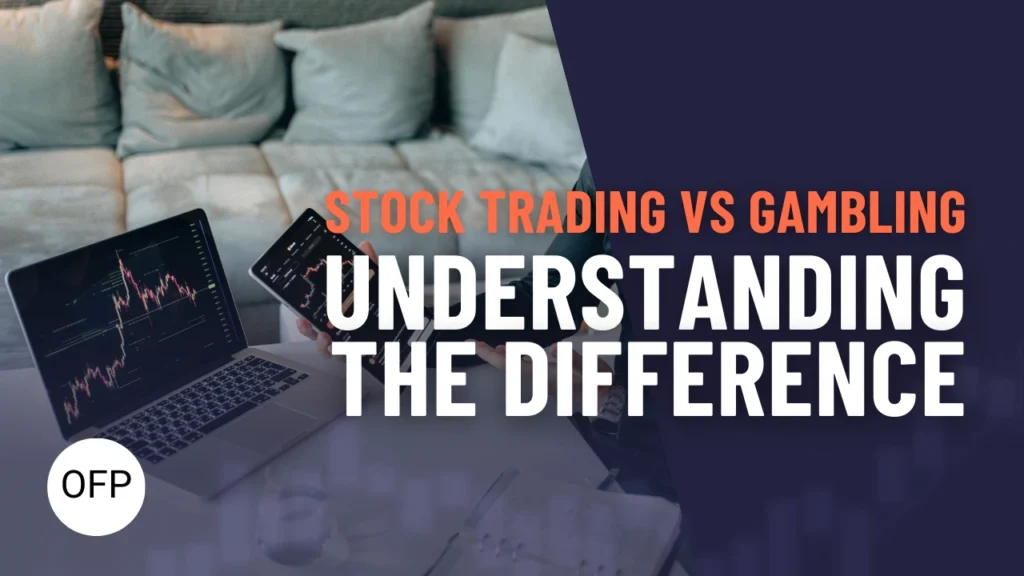Many people in the finance industry compare stock trading to gambling, questioning if the two are the same. Although both involve risks and the prospect of financial loss, there are important distinctions. Stock trading is focused on strategy, market analysis, and calculated risks, whereas gambling is mostly dependent on chance. Many traders gamble without even realizing it; they trade in a way entirely opposed to market success. Stock Trading vs Gambling; Which one is the best approach?
Stock Trading vs Gambling: The Main Differences
At first glance, stock trading and gambling may appear to be similar because both involve taking financial risks. However, stock trading is more than just a game of chance; it is a process that requires knowledge, experience, and a solid understanding of financial markets. Gambling, on the other hand, is a form of entertainment that is mainly dependent on luck. Understanding these differences is crucial for anybody considering investing or trading in the stock market.
Are you ready to take your trading to the next level?
Join OFP Funding Today
Start trading with the support of professionals!
Stock Trading vs Gambling: Timeframe and Focus
Stock trading can focus on both short-term and long-term strategies, but many successful traders emphasize a long-term approach. They aim for steady returns over the years by trading stocks they believe will perform well over time. These traders remain patient during market fluctuations, understanding that their strategy is built for sustained growth.
Gambling, on the other hand, has a short-term focus, seeking quick, high returns. This approach often results in losses due to market volatility. It involves frequent trades, leading to higher transaction fees, which long-term traders aim to avoid.
Stock Trading vs Gambling: Stocks vs Trends
The fundamental principle of investing is to buy low, sell high. Investors prefer to buy stocks at or near a low point, especially in weak markets or when looking for undervalued stocks.
In contrast, gamblers buy based on trends, such as investing in rising markets or pursuing hot stocks. They hope that these trends will last long enough to generate a profit. Recent developments in cryptocurrencies, DeFi, NFTs, and the metaverse demonstrate the dangers of focusing on trends rather than fundamentals.
Stock Trading vs Gambling: Fundamentals
Stock trading frequently employs valuation metrics such as the price-earnings ratio (P/E) and book value. Traders evaluate a company’s position in its industry and the competitiveness of its offerings. They also analyze new developments that may affect performance. Decisions can be influenced by management experience and strategy, such as Elon Musk’s at Twitter (now X). If a stock appears to be inexpensive, traders may consider it a purchasing opportunity.
In contrast, gambling frequently disregards basic fundamentals. Gamblers look at recent performance or patterns, such as prospective takeover targets. They typically sell soon following events, neglecting the stock’s long-term potential.
Stock Trading vs Gambling: Diversification
Stock trading emphasizes diversification as a key risk management strategy. Traders spread their investments across various sectors to reduce exposure to any single asset. This strategy reduces market volatility risks while aiming for more consistent results. Furthermore, it protects against future losses and improves portfolio stability.
Alternatively, gambling chases quick returns. Gamblers often concentrate their money in the best-performing sectors, such as energy, sometimes investing 70-80% in one area. This strategy can yield significant short-term gains, but when trends reverse, gamblers risk losing everything.
Unlock your full potential as a trader with OFP Funding!
Sign up now
And access top-tier conditions to elevate your trading strategy!
Risk Management: A Key Distinction
One of the main differences between stock trading and gambling is how they manage risk. Traders use tools like stop-loss orders to protect their investments from major losses. In contrast, once a gambler places a bet, the outcome is out of their control, exposing them to uncertainty. This demonstrates that stock trading is more calculated and controlled, while gambling is inherently random.
Stock Trading vs Gambling: The role of Psychology
Psychology is important in both stock trading and gambling, but the two are not the same. Successful traders rely on discipline, patience, and emotional control. They recognize the value of sticking to a strategy and not allowing emotions to distort their judgment. In gambling, however, decisions are frequently influenced by impulses and the need for a quick payout. Gamblers can become absorbed in the thrill of the moment, whereas traders must remain focused on their long-term objectives.
Conclusion: Understanding the Difference
While both stock trading and gambling involve risks, their fundamental natures are significantly different. Stock trading is a strategic and analytical process. It requires knowledge of fundamentals, research, and a long-term perspective. Traders use market analysis and risk management techniques to make calculated decisions.
Gambling relies mainly on luck. There is minimal control over outcomes, and it lacks a coherent long-term strategy.
The excitement often comes from immediate action, which can lead to impulsive decisions.
For those entering the stock market, recognizing these distinctions is crucial. A well-informed mindset and a focus on strategy can bring sustainable success. Understanding these differences allows traders to trade confidently and avoid the pitfalls of a gambling mentality. Ultimately, a disciplined approach to stock trading can turn risks into opportunities for growth and financial success.
Are You Ready to Skip the Time Consuming Challenges
and Dive Right into Trading With an Instantly Funded Account?
CLICK THE BUTTON BELOW
and customize
your Instant Funded account today!
Want to Trade with the Best Conditions in the Market?
Get an Instantly Funded Account with OFP and enjoy immediate access to the capital, without any challenge or verification phase to pass
If you found this post valuable, please share it with a friend and subscribe to our blog/Youtube channel for more insights.

